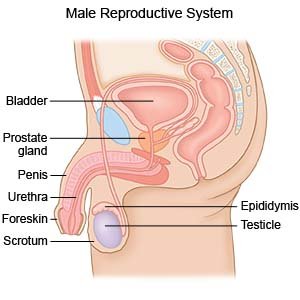Perineal Prostatectomy
Medically reviewed by Drugs.com. Last updated on Jun 5, 2024.
A perineal prostatectomy is surgery to remove your prostate gland.
 |
DISCHARGE INSTRUCTIONS:
Call your local emergency number (911 in the US) for any of the following:
- You suddenly feel lightheaded and short of breath.
- You have chest pain when you take a deep breath or cough.
- You cough up blood.
Call your doctor or surgeon if:
- Your arm or leg feels warm, tender, and painful. It may look swollen and red.
- Blood soaks through your bandage.
- You are leaking more urine than usual.
- You have new trouble moving your legs.
- You have abdominal or pelvic pain that does not go away, even after you take pain medicine.
- You cannot control your bowel movements.
- You cannot get an erection.
- You have a fever.
- You see blood in your urine, or your urine is cloudy and smells bad.
- Your surgery wound is red, swollen, or has pus coming from it.
- Your urine stream becomes slower than normal, or you are urinating only small amounts.
- You have questions or concerns about your condition or care.
Medicines:
- Medicines may be given to decrease pain and prevent a bacterial infection. You may also need medicine to make it easier to have a bowel movement.
- Take your medicine as directed. Contact your healthcare provider if you think your medicine is not helping or if you have side effects. Tell your provider if you are allergic to any medicine. Keep a list of the medicines, vitamins, and herbs you take. Include the amounts, and when and why you take them. Bring the list or the pill bottles to follow-up visits. Carry your medicine list with you in case of an emergency.
Wound care:
Care for your wound as directed. Carefully wash the wound with soap and water. Dry the area and put on new, clean bandages as directed. Change your bandages when they get wet or dirty. Take showers instead of baths until your healthcare provider says it is okay to take a bath.
Foley catheter care:
Keep the bag below your waist. If the bag is too high, urine will flow back into your bladder. This can cause an infection. Do not pull on the catheter. This may cause pain and bleeding, and the catheter may come out. Do not let the catheter tubing kink or twist. A kink or twist will block the flow of urine.
Bladder control:
After surgery, you may leak urine and have trouble controlling when you urinate. Ask for more information about the following ways to help decrease urine leakage:
- Avoid caffeine. It can cause problems with bladder control and increase your need to urinate.
- Do pelvic floor muscle exercises. They may help improve your bladder control. These exercises are done by tightening and relaxing your pelvic muscles. Ask how to do pelvic floor muscle exercises, and how often to do them.
- Limit your liquid intake. Drink smaller amounts of liquid throughout the day. Do not drink before bedtime. Ask if you should decrease the amount of liquid you drink each day. This may help you control your bladder.
- Wear a pad or adult diapers. These may help absorb leaking urine and decrease odor.
Bowel control:
After surgery, you may have trouble controlling when you have a bowel movement. You may regain control of your bowel movements over time. Ask what you can do to increase control of your bowels and prevent leaking bowel movements.
Follow up with your doctor or surgeon as directed:
You may need to return to have your Foley catheter removed. You may need to return for blood tests or to have the surgical area checked. Write down your questions so you remember to ask them during your visits.
© Copyright Merative 2024 Information is for End User's use only and may not be sold, redistributed or otherwise used for commercial purposes.
The above information is an educational aid only. It is not intended as medical advice for individual conditions or treatments. Talk to your doctor, nurse or pharmacist before following any medical regimen to see if it is safe and effective for you.
Learn more about Perineal Prostatectomy
Care guides
Further information
Always consult your healthcare provider to ensure the information displayed on this page applies to your personal circumstances.
